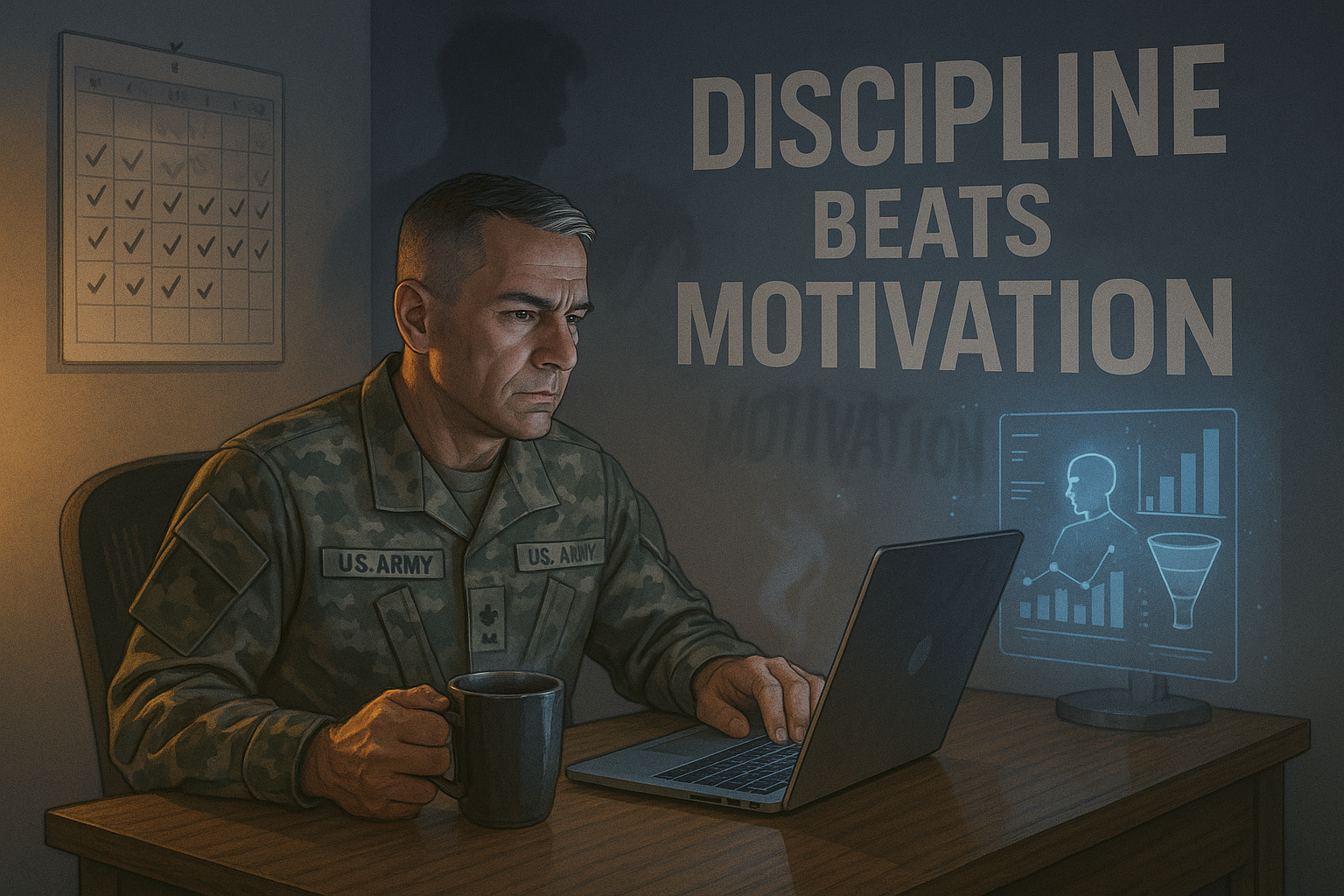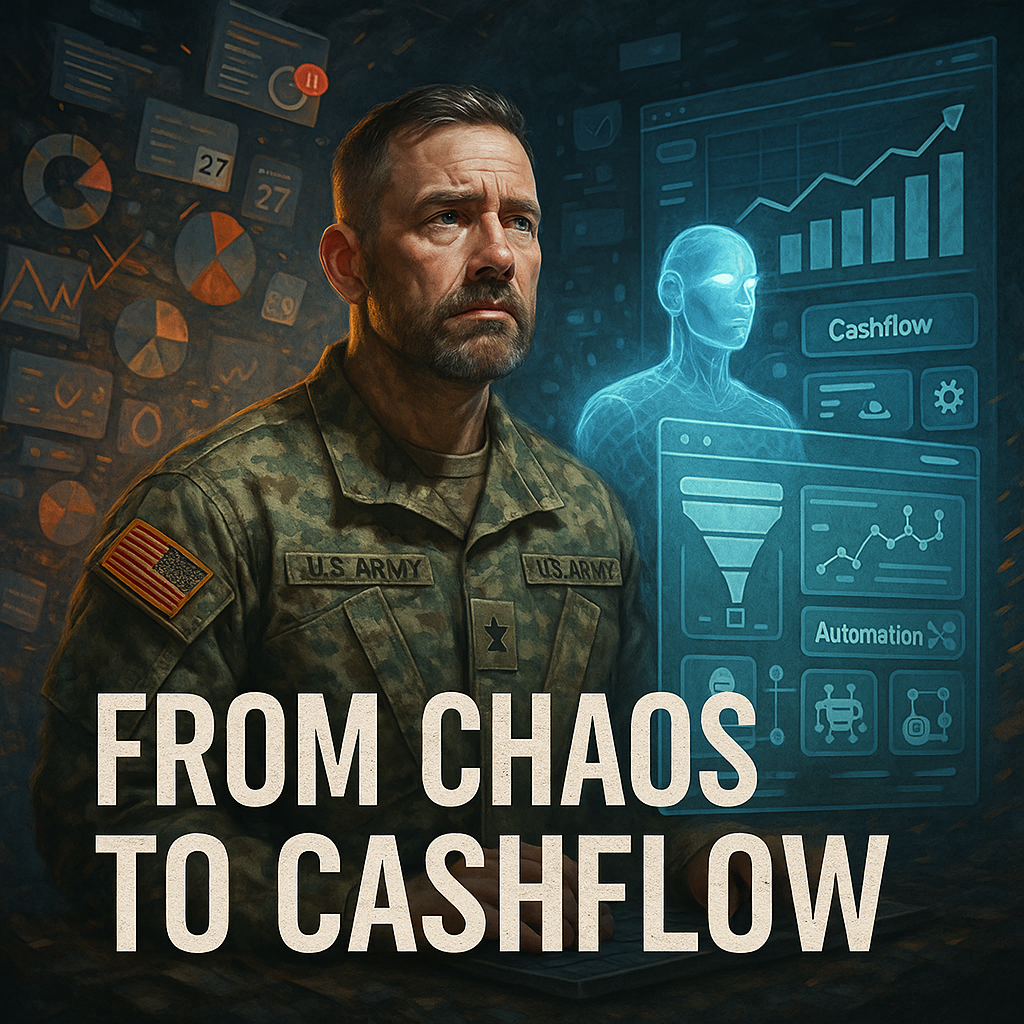Confession: When I swapped my uniform for a blazer, I assumed my days as a leader were over. Turns out, the toughest lessons in business are eerily similar to those I'd faced in uniform—except the orders come from within. I’ve led teams at 3AM in muddy boots and in conference rooms fueled by bad coffee; both environments demand vision, grit, and the courage to own every decision. Today, let’s unpack the raw, sometimes messy reality of how veterans drive business growth—and why their version of leadership flips the usual script.
The Veteran’s Playbook: Unpacking Military Leadership for Business Success
Military experience isn’t just a badge—it’s a leadership bootcamp (minus the 5AM wakeup calls). When I transitioned from active duty to entrepreneurship, I quickly realized that the skills drilled into me on the field were the same ones that drive business growth. Military Leadership Principles don’t stay behind at the base; they become the backbone of effective Business Leadership.
From Battlefield to Boardroom: Transferable Leadership Skills
Let’s break down what military service really teaches you about leading a team. In the military, leadership is about more than giving orders—it’s about earning trust, setting a clear vision, and empowering your people. These are the same leadership skills that fuel business success:
- Discipline: Military life is built on discipline. In business, this means showing up, following through, and setting the standard for your team.
- Adaptability: Plans rarely survive first contact—on the battlefield or in the boardroom. Veterans know how to pivot fast and keep the mission moving.
- Quick Decision-Making Under Pressure: When the stakes are high, veterans don’t freeze. We assess, decide, and act—skills that are gold in business operations.
- Empowering Teams: In the field, everyone’s contribution matters. Veterans are trained to delegate, trust, and bring out the best in their people.
- Clear Vision: Every mission starts with a clear objective. Veterans excel at communicating the “why” and aligning teams around it.
Risk Management Expertise: The Veteran Advantage
Military training is a masterclass in risk management expertise. Every operation is a lesson in weighing threats, identifying opportunities, and making informed choices—often with incomplete information. That’s why veterans are naturals at steering businesses through uncertainty. As John Maxwell puts it:
Military experience sharpens your ability to adapt and decide swiftly, giving veterans a natural advantage in entrepreneurship.
In business, this translates to:
- Spotting risks before they become crises
- Developing contingency plans
- Making confident decisions when others hesitate
Real-World Example: Adapting on the Fly
Quick tangent—one of my proudest moments as a business leader came straight from my military playbook. Midway through a critical project, we hit a wall: the market shifted, and our strategy was suddenly obsolete. Most teams would have stalled, but I drew on my experience adapting in unpredictable field conditions. I gathered my team, laid out the new intel, and convinced everyone to pivot—fast. Heads were spinning, but because we’d practiced adaptability, we not only delivered on time, we exceeded our goals. The results spoke loudest.
Building Trust: The Core of Leadership Influence
In the military, trust isn’t optional—it’s survival training. You learn quickly that your team needs to trust you, and you need to trust them. This core principle is just as vital in business leadership. Whether you’re launching a startup or managing a team of five, trust is your most valuable currency. Veterans know how to:
- Lead by example—showing, not just telling
- Communicate with clarity—eliminating confusion and aligning the team
- Stay accountable—owning both wins and losses
Accountability in Leadership: Owning the Mission
Accountability isn’t just a buzzword. In the service, if you drop the ball, the consequences are real. That sense of responsibility carries over into business. As a veteran entrepreneur, I’ve learned to own every outcome—good or bad. This sets the tone for the whole team and builds a culture where people are empowered to take initiative and learn from mistakes.
Veteran Support: Resources for Business Growth
Today, there are more resources than ever for veteran entrepreneurs—grants, incubators, and networks designed to help you apply your military leadership principles to business. If you’re a veteran, don’t hesitate to tap into these. Your experience is your edge.
Military leadership isn’t about rank—it’s about influence, vision, and action. Veterans bring a unique blend of risk management expertise, decision-making under pressure, and team empowerment that can transform any business operation.
Influence > Authority: Leadership Habits from the Field to the Office
Let me start with a confession: my first civilian leadership role was a mess. I walked in, assumed my team would just do what I said, and expected instant results. After all, in the military, orders are orders. But in business? Not even close. My team looked at me like I was speaking a foreign language. That was my wake-up call: leadership influence in business is earned, not given.
Leadership is not about titles, positions, or flowcharts. It is about one life influencing another. – John C. Maxwell
From Command to Connection: The Real Power of Leadership Influence
Military leadership taught me that authority is just a starting point. Real leaders inspire action through trust, vision, and example. In business, leadership habits from the field translate into powerful tools for growth. It’s not about barking orders—it’s about building a team that wants to follow you because they believe in the mission.
Four Military-Born Leadership Habits for Business Growth
Here are the four leadership habits that transformed my approach and can do the same for you:
- Lead by Example – In the field, the leader is always the first in and last out. In the office, this means showing up prepared, tackling tough tasks, and never asking your team to do something you wouldn’t do yourself. When your team sees you living the standard, they’ll rise to meet it. Leadership influence starts with your own actions.
- Communicate with Clarity – Military operations depend on clear, concise orders. In business, effective communication eliminates confusion and aligns everyone to the same goal. I learned quickly that vague instructions lead to missed deadlines and frustration. Now, I make sure every team member knows the mission, their role, and how success is measured.
- Empower Others – In the service, you trust your team with real responsibility—sometimes, it’s life or death. In business, empowering teams means giving people ownership of their work and the freedom to solve problems. Micromanagement kills morale. Trust builds it. When I started delegating real authority, my team’s creativity and engagement skyrocketed.
- Stay Accountable – Here’s the hard truth: accountability in leadership stings when the outcome isn’t pretty. In the military, you own your mistakes and your wins. In business, I learned to step up and say, “That’s on me,” when things went sideways. It was humbling, but it built trust. Accountability isn’t just about blame—it’s about learning, improving, and bonding as a team.
Challenge Coins for the Boardroom?
Here’s a wild thought: what if boardrooms handed out challenge coins for handling tough feedback or owning a mistake, just like we did for missions? In the military, a challenge coin is a symbol of respect for a job well done or a challenge overcome. Imagine the culture shift if businesses celebrated accountability and resilience the same way. Accountability in leadership would become a badge of honor, not a mark of shame.
Earned Trust vs. Positional Power
The biggest lesson I brought from the field to the office is this: Positional power fades fast, but earned trust lasts. You can have the title, the office, the corner desk—but if your team doesn’t trust you, your influence is zero. Empowering teams and effective communication are how you build that trust, day by day.
Real Talk: Learning from Mistakes
I’ll never forget the first time I had to stand in front of my new team and admit I’d messed up. It stung. But that moment of vulnerability turned into a turning point. My team saw I was human, and that I cared more about the mission than my ego. That’s when we started to click—not because I had authority, but because I had influence.
- Leadership Habits are built on daily actions, not job titles.
- Effective Communication is the glue that holds teams together.
- Empowering Teams leads to innovation and loyalty.
- Accountability in Leadership creates trust and growth.
Clarity in Chaos: Translating Military Grit to Entrepreneurial Guts
Let me take a quick detour before diving in: The best business lesson I ever learned didn’t come from a business school or a bestselling book. It came from weeks of cleaning sand out of my boots in the desert—resilience is non-negotiable. In the military, you learn quickly that chaos is inevitable, but clarity is a choice. That same lesson is the backbone of every successful veteran entrepreneur I know. In business, just like in the field, the ability to stay focused, adapt, and persevere is what separates those who thrive from those who fold under pressure.
Veterans are no strangers to uncertainty. We’re trained to find order in the midst of confusion, to keep our eyes on the mission when everything else is up in the air. That’s why resilience and perseverance are more than buzzwords for us—they’re survival skills. I’ve faced setbacks that would make most people want to quit: supply chains breaking down, plans falling apart, and, yes, sales pitches crashing and burning in front of key clients. But here’s the thing—veterans don’t see failure as the end. We see it as a signal to regroup, reassess, and push forward with even more determination.
Let me share a quick story. Early in my entrepreneurial journey, my team and I spent weeks preparing for a major sales pitch. We thought we had everything dialed in, but when the big day came, our presentation flopped. The client wasn’t impressed, and we walked out feeling defeated. But instead of letting it break us, we treated it like an after-action review—just like we did in the service. We analyzed what went wrong, adjusted our approach, and came back two weeks later with a stronger, more focused pitch. Not only did we land the deal, but we built a relationship that became the foundation for future business success. That relentless problem-solving attitude—turning unease into opportunity—is what military grit looks like in the business world.
Strategic planning is another skill that veterans bring to the table. In the military, every mission starts with a clear, visible plan. Everyone knows the objective, the roles, and the fallback options. I’ve carried that habit into my business life. I keep our mission plans visible—literally—on the wall of our workspace. It’s a constant reminder of what we’re working toward and why it matters. This simple practice keeps my team aligned, focused, and motivated, even when the going gets tough. It echoes how military teams rally around a shared, visible goal, and it’s a game-changer for business growth.
Adaptability and discipline are the unsung heroes of entrepreneurship. The market shifts, competitors pivot, and sometimes your best-laid plans unravel overnight. Veterans know how to adapt on the fly without losing sight of the mission. We’re disciplined enough to stick to our values, but flexible enough to change tactics when needed. That combination is a powerful driver of business success—especially in fast-moving industries where yesterday’s playbook won’t win today’s game.
One thing I’ve noticed among veteran entrepreneurs is a tendency to build mission-driven and socially conscious businesses. We’re used to working for a cause greater than ourselves, and that sense of purpose translates directly into the companies we create. When your business is anchored in a clear mission, it’s easier to inspire your team, earn customer loyalty, and weather the inevitable storms.
Resilience is the secret weapon of every successful veteran entrepreneur. — Brene Brown
At the end of the day, grit underpins every entrepreneurial victory. Strong leadership creates trust, direction, and momentum. Veterans know how to create a shared vision and set visible goals that keep teams focused and driven, even when chaos reigns. If you want to lead from the front in business, take a page from the veteran playbook: embrace resilience and perseverance, master strategic planning, sharpen your problem-solving abilities, and never lose sight of your mission. That’s how you turn military grit into entrepreneurial guts—and that’s how you win, no matter what challenges come your way.
TL;DR: Veterans excel in business because they lead with influence, clarity, and accountability—skills honed beneath the surface, but unmistakably powerful in the boardroom. Tap into your military training, lead with vision, and watch success multiply—for you and your team.



